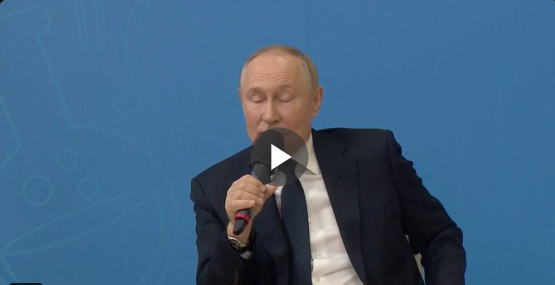The Ukrainian incursion into Russia’s Kursk region, which began in August, appears to have met several obstacles and may not have achieved its key objectives. Initially designed to create a buffer zone and disrupt Russian forces, the operation has led to intense fighting but has not significantly shifted Russia’s military focus from the strategic Pokrovsk area, where heavy fighting continues. Ukrainian forces were aiming to divert Russian resources, but Moscow has continued its offensive in key areas like Donetsk without significant delays( KVIA and MilVet Benefits
Ukraine’s recent military operation into Russia’s Kursk region, while achieving some tactical gains, has fallen short of a strategic victory. The primary goal of diverting Russian forces from the intense battles in eastern Ukraine did not materialize, leaving Kyiv open to criticism amidst Russia’s significant territorial advances along the 600-mile eastern front.
Russian President Vladimir Putin said Monday that Ukraine’s incursion in the Kursk region will fail and wouldn’t stop Russian forces from advancing in Donbas. Both sides are engaging in massive ground offenses https://t.co/o1x1x8M5fD pic.twitter.com/lkPD1pQFlm
— Bloomberg TV (@BloombergTV) September 3, 2024
During an unexpected move in August, Ukrainian forces made their way into Kursk, undermining Russia’s perceived military strength by capturing territory, prisoners, and destroying military assets. Despite these successes, the operation’s main strategic intent—to distract and disperse Russian military efforts from the Donbas region—has not been fulfilled.
Ukrainian officials, including Commander-in-Chief Gen. Oleksandr Syrskyi, have defended the operation, citing it as a strategic success for moving the battle onto Russian territory and reducing the threat of a Russian offensive from the Kursk region KVIA However, the gains made in Kursk, such as minor territorial control and cutting some infrastructure, are seen as more symbolic than strategically decisive MilVet Benefits Some Ukrainian troops have been redeployed from other areas to support the incursion, potentially weakening defenses on other fronts MilVet Benefits and RadioFreeEurope/RadioLiberty
Russian President Vladimir Putin, visiting a school, emphasized that the Ukrainian forces failed to halt the Russian offensive in the Donbas, a key region where fighting has intensified. This assertion came as Russian troops continued to make significant advances, encroaching on crucial areas like the rail junction town of Pokrovsk in the Donetsk region, which is pivotal for both logistics and tactical leverage.
On the domestic front, Ukrainian President Volodymyr Zelensky defends the Kursk offensive as integral to Ukraine’s broader military strategy. He argues that the operation has validated Ukraine’s tactical approaches, stressing the importance of pushing the conflict into Russian territories to truly impose the war’s consequences on Russia.
Head of the Ukraine army, Gen. Syrski, admitted today the Kursk offensive has failed in achieving its primary objective of getting Russia to move forces from the Donbass to Kursk.
Meanwhile, Ukraine Kursk offensive has stalled as Russia starts taking back territory!!!
Russia… pic.twitter.com/xzY0m2RVwe
— MASHIAHIYIM QODESHIM TALMIDIM (@AlvesPedro57992) August 31, 2024
Criticism within Ukraine has also surfaced, with concerns about the allocation of military resources and the strategic wisdom of the Kursk incursion. Mariana Bezuhla, a Ukrainian Parliament member, criticized the deployment of inexperienced troops in critical defensive positions, highlighting the grave costs in human lives and territorial security.
Furthermore, international analysts have voiced skepticism about the long-term efficacy of the Kursk operation. Stephen Walt from Harvard’s Kennedy School remarked that although the operation has lifted Ukrainian morale and exposed Russian vulnerabilities, it represents only a minor slice of Russian territory and is unlikely to shift the broader strategic balance. Michael O’Hanlon of the Brookings Institution also noted the operation’s significant costs, suggesting that it might have been more prudent to bolster defenses rather than extend into new offensive maneuvers.
Ukraine’s top general admits Kursk incursion failed to reach intended goals pic.twitter.com/RMeKNGgNQD
— RT (@RT_com) August 28, 2024
As the situation evolves, the Kursk operation continues to be a focal point of military and political analysis, reflecting the complex dynamics of the ongoing conflict between Ukraine and Russia.
Major Points:
- Ukraine’s military incursion into Russia’s Kursk region did not achieve its primary goal of diverting Russian forces from the eastern front, despite some tactical successes like capturing territory and prisoners.
- Despite the incursion, Russian forces have continued their offensive in the Donbas region, making significant territorial gains and advancing towards strategic locations such as the town of Pokrovsk.
- Criticism within Ukraine has emerged over the strategic execution of the Kursk operation, with concerns about the deployment of inexperienced troops in key defensive roles, leading to significant losses.
- Ukrainian President Volodymyr Zelensky supports the Kursk offensive as a crucial part of Kyiv’s broader military strategy, arguing that it demonstrates the effectiveness of pushing the conflict into Russian territory.
- Analysts like Stephen Walt and Michael O’Hanlon have expressed skepticism about the strategic value of the Kursk incursion, noting it as a minor territorial gain that may not significantly alter the larger conflict dynamics.
Susan Guglielmo – Reprinted with permission of Whatfinger News


